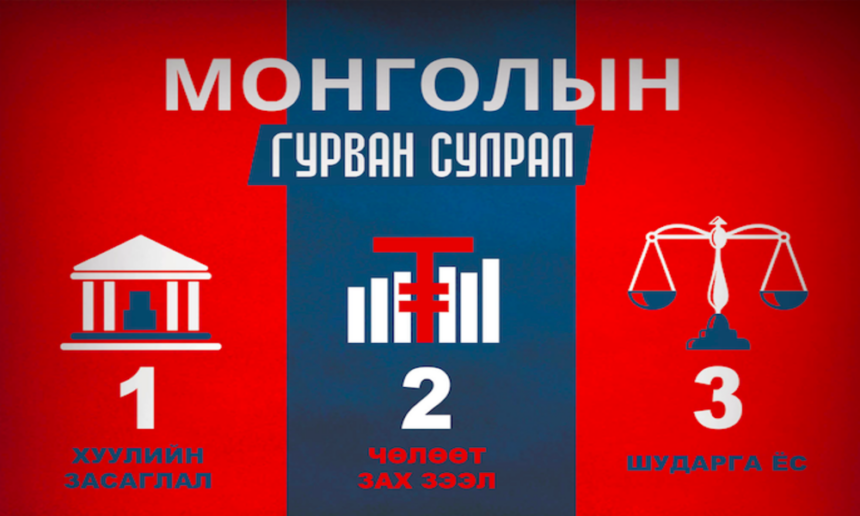Democratic governance, free market, and justice are three pillars that need to be well developed to enable a nation to achieve development and improve livelihoods. During the last 30 years Mongolia has been controlling its own destiny. How is it going with the development of these three pillars? Which issues need to be resolved, and what challenges are we facing today?
Rule of law
In higher developed countries, governments are formed through democratic elections and their performance assessed at the following election. If political parties deliver what they promised, they get re-elected. If not, there will be another political force who assumes the ruling power.
The political parties, having obtained the ruling power, craft legislation, which should then be effectively implemented by the executive branch. This system positively contributes to economic development. In Mongolia, the law-making process is currently defective, and the ruling political parties have been passing laws that suit their election term only and lack a long-term vision. This becomes evident with the ruling parties’ punctual delivery of amendment to the election law before every election.
Furthermore, laws are now created to serve and protect specific interests of individuals and groups who yield political power in Mongolia. For example, a law was enacted that allows embezzlement cases to be closed if a set period of investigation expires. Individuals were allowed to steal from public funds via state-owned companies and banks, and then get off scot-free because of the law on pardons. The law on transparency was passed in 2016, pardoning those who stole from public funds after Mongolia raised its largest ever loan from abroad. This law also uncovered capital worth 33 trillion MNT, which is bigger than our entire economy, and allowed the construction of hundreds of buildings in the southern skirts of Ulaanbaatar.
The two largest political parties – the Mongolian People’s Party (MPP) and the Democratic Party (DP) – have never accurately reported their financial dealings, despite being required to do so by law. Because their financing remains hidden, the Mongolian government is in the grip of oligarchs. Positions in the government are now commodified and traded with.
The rule of law is weak in Mongolia.
Free market
Throughout the history of mankind, free market is the only system that has created so much material value. The free market system is based entirely on private ownership. Under communism, private ownership is prohibited and public ownership is the only form of ownership, which is why communist economies fully collapse.
Since our separation from communism, Mongolia continues its efforts to fully form private ownership. Within the 30 years under a market economy, Mongolians have amassed the most private ownership ever in our history. Our economy has grown, livelihoods improved, and life expectancy increased by 10 years. Our population has grown by 50 per cent, and our livestock by 250 per cent.

State-owned factories and facilities were privatized, and state-owned livestock was sold to herders. Within 30 years, the livestock headcount increased 2.5 times to 66 million. The number of sheep increased twofold to 30 million and the number of goats increased 5.3 times to 27 million. Apartment units were also privatized, benefitting whoever was living in them, and so was land. People had been given the freedom to engage in business, which resulted in more factories and facilities that were run privately.
However, most of state-owned facilities and land were stolen by the authorities in local governments and ministries at that time. A striking example is provided by how the land in mountain passes was granted to the south of Ulaanbaatar, Yarmag, and the center of the city.
Illegally obtaining private ownership has been normalized in Mongolia.
Justice
The judiciary has the duty to ensure justice. The aforementioned challenges in the rule of law and free market also demonstrate that our judiciary is dysfunctional today. Justice starts with holding those who violate the law accountable for their actions. The Mongolian judiciary is unable to hold corrupt officials accountable, which is why the Financial Action Task Force (FATF), combatting money laundering and terrorism financing, is about to put Mongolia back on their grey list.
Our judiciary has become overly dependent on one individual – the President, therefore the governing structure is about to be changed. Due to sinking in corruption, Mongolia is preparing to make the first ever changes to the constitution in this century. Notwithstanding the amendments, we won’t be able to eliminate absolute poverty unless the laws are effectively implemented.
Most importantly, Mongolia’s poverty traces back to political crises, not economic declines.Those who obtain political power have been becoming wealthy, which steered people increasingly into aiming for those positions by means of politicizing and taking sides. This has seeped into every level of society, causing even the separation of families along political lines.
In this sense, there is a connection to personal development. Our current education system aims to give more knowledge to students, rather than helping them become ethical people. Mongolians don’t have a strong desire to work together towards a common goal or protect shared interests.
Injustice is dominant in Mongolia today.
In short, because we’re not able to strengthen the three key pillars of development, Mongolia is unable to reap the benefits of its achievements equally and effectively. Our biggest challenge today is to make these three pillars stronger and more stable.
2019.07.17
Trans. by B.Amar












